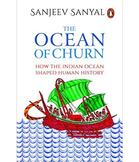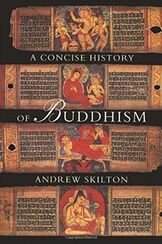
Late in 2022 I read a survey history book on India , India, A History by John Keay. It was an excellent book but any single volume "history of India" is the rough equivalent of a similar book called "a history of Europe."
The subject is vast, especially when the book starts with pre-literate societies, known only from archaeology. After the Keay book I started fishing around for more Indian History. While I have a basic knowledge of the history of India? It is not particularly deep, nor does it extend much earlier than the modern era.
The Ocean of Churn by Sanjeev Sanyal is more about the Indian Ocean than India but its point is that the ocean here was a cultural link that transcended any single culture. It is also written by an Indian author who dispenses with some of the fanciful notions that even fairly responsible western historians cling to (see Ashoka). While it isn't as well documented as the Keay book? It raises more thought provoking ideas--even if many of these are tossed out without documentation. It also makes the vast scope more manageable than the Keay book, which is sometimes bogged down in an over abundance of names and place names.
Ocean of Churn also illustrates the horror of European incursions into the Indian Ocean and the depredations of all Europeans who appeared (some, far worse than others). These incursions, when compared with earlier invasions and migrations demonstrate the Europeans were far more deleterious--especially the British.
The book is written in a conversational, almost breezy, style that makes it a quick read. Sanyal also has a great sense of humor. It is also an informative one that points the reader in the direction of further sources, further information.
This book has also been adapted for children.
The subject is vast, especially when the book starts with pre-literate societies, known only from archaeology. After the Keay book I started fishing around for more Indian History. While I have a basic knowledge of the history of India? It is not particularly deep, nor does it extend much earlier than the modern era.
The Ocean of Churn by Sanjeev Sanyal is more about the Indian Ocean than India but its point is that the ocean here was a cultural link that transcended any single culture. It is also written by an Indian author who dispenses with some of the fanciful notions that even fairly responsible western historians cling to (see Ashoka). While it isn't as well documented as the Keay book? It raises more thought provoking ideas--even if many of these are tossed out without documentation. It also makes the vast scope more manageable than the Keay book, which is sometimes bogged down in an over abundance of names and place names.
Ocean of Churn also illustrates the horror of European incursions into the Indian Ocean and the depredations of all Europeans who appeared (some, far worse than others). These incursions, when compared with earlier invasions and migrations demonstrate the Europeans were far more deleterious--especially the British.
The book is written in a conversational, almost breezy, style that makes it a quick read. Sanyal also has a great sense of humor. It is also an informative one that points the reader in the direction of further sources, further information.
This book has also been adapted for children.

 RSS Feed
RSS Feed